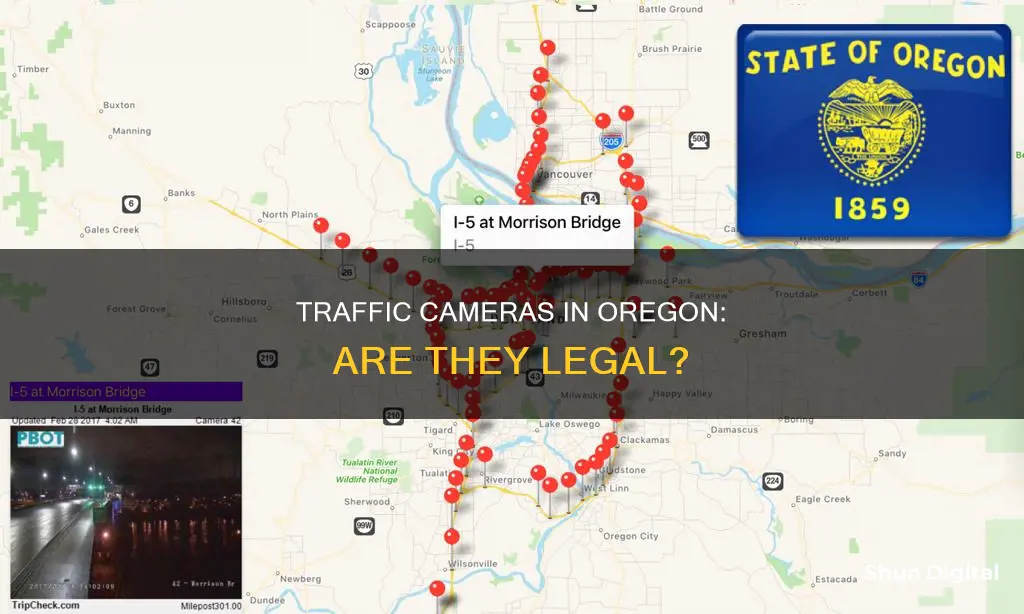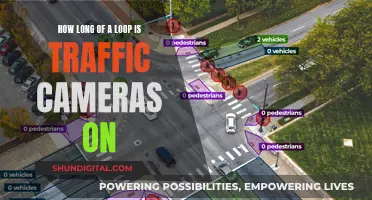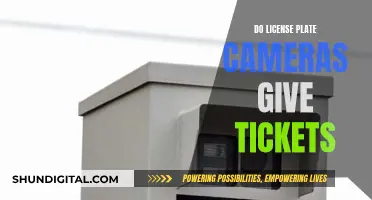
Red light and speed cameras are legal in Oregon. These cameras are triggered by vehicles passing over sensors after a signal has turned red, capturing photo and video evidence of traffic violations. While some Oregon residents have privacy concerns about the use of these cameras, others argue that they improve traffic safety and reduce fatal crashes.
| Characteristics | Values |
|---|---|
| Are traffic cameras legal in Oregon? | Yes |
| Which areas in Oregon have traffic cameras? | Most of them are in the northwestern part of the state, especially in the Portland area |
| What are the traffic cameras used for? | To monitor speed and red-light violations |
| What happens if a traffic camera captures a violation? | A citation is mailed to the registered owner of the vehicle |
| How much is the fine for a red-light violation in Oregon? | $265 |
| How much is the fine for a speeding violation in Oregon? | $165-$440 |
| Who reviews the footage from traffic cameras? | A police officer or a "duly authorized traffic enforcement agent" |
| Are there any signs indicating the presence of traffic cameras? | Yes, signs are posted on major routes and before each camera-enforced intersection |
What You'll Learn

Red light cameras are legal in Oregon
The presence of red light cameras is indicated by signs posted on major routes and streets, as well as near the camera-enforced intersections. These signs warn drivers that compliance with traffic control devices is enforced through the use of cameras. The use of photo radar in speeding enforcement is also allowed in Oregon, aiding in the enforcement of speed laws.
The registered owner of the vehicle captured by a red light camera will receive a citation or ticket, typically through mail, which includes information about the violation and the associated fine. The standard fine for running a red light in Oregon is $265, one of the highest in the nation.
While red light cameras are legal in Oregon, there are certain considerations and requirements that govern their use. For example, the yellow light at a signal with a red light camera must last for at least the length of time recommended by the standard set by the Institute of Transportation Engineers. Additionally, there are specified time frames within which citations must be issued and responded to.
It is worth noting that the use of red light cameras and other automated traffic enforcement tools has been a subject of debate among lawmakers in Oregon. While some argue that these tools improve traffic safety and reduce crashes, others raise concerns about privacy and the potential expansion of surveillance. Nonetheless, as of 2023, the use of red light cameras in Oregon remains legal, with the primary goal of enhancing road safety and reducing the number of urban crashes caused by red-light runners.
Dummy Battery Camera: What's the Deal?
You may want to see also

Cameras are triggered by vehicles passing over sensors after the signal turns red
Red light cameras are legal in Oregon. Municipalities set up red light cameras to enforce traffic light laws and catch drivers who violate them.
Red light camera systems connect the camera, traffic light, and sensors to monitor traffic. Cameras are triggered by vehicles passing over sensors after the signal turns red. The camera will capture photo and video evidence—including the offender's license plate. The camera records the date, time of day, time elapsed since the beginning of the red signal, and the speed of the vehicle. A second photograph is taken, showing the red light violator in the intersection.
In Oregon, the owner of the vehicle will receive a ticket in the mail, including photographs of the violation and the license plate, and instructions for paying the associated fine or appearing in court. The standard fine for running a red light in Oregon is $265.
Red light cameras are most commonly found in the northwestern part of Oregon, especially in Portland.
Unlocking Edits: Adobe Camera Raw Secrets
You may want to see also

Oregon residents can contest a ticket
Red light cameras are legal in Oregon. If you receive a ticket, you can either pay the fine or fight it in court. Here's a step-by-step guide for Oregon residents on how to contest a ticket:
Step 1: Understand Your Options
Before contesting a ticket, it's important to weigh the potential implications of simply paying the fine. Consider factors such as increased insurance rates, criminal records, the strength of your case, and the time commitment involved in contesting the ticket. Remember that you have the right to a trial, and if you can prove your innocence, it may be worth fighting the ticket to keep your record clean.
Step 2: Respond Within the Given Timeframe
In Oregon, you typically have ten business days to respond to a traffic citation. The citation will provide details of the alleged offense and inform you of where to submit your response. If you choose to fight the ticket, you'll need to enter a plea at the clerk's office of the courthouse indicated on the ticket.
Step 3: Decide on Self-Representation or Hiring an Attorney
If you decide to contest your ticket, you can choose to represent yourself or hire an attorney. Self-representation can be challenging, as you'll need to present and cross-examine witnesses, submit evidence, and negotiate. Hiring an attorney can be more expensive, but it may be worth it if you can provide proof of financial hardship or if the limitations of self-representation become overwhelming.
Step 4: Plead "Not Guilty" and Request a Trial
To contest your ticket, you'll need to plead "not guilty." You can do this by submitting a written request for a trial or by visiting the court during business hours before the court date on your ticket to set a trial date. Remember that the court clerk will schedule the trial within 90 days of the initial arraignment date.
Step 5: Gather Evidence and Prepare Your Case
If you decide to contest your ticket, it's important to gather any evidence that may support your case. This could include photos, diagrams, maps, or witnesses who can testify on your behalf. Be prepared to present your case clearly and simply, and avoid using legal terms you don't fully understand. Remember that the burden of proof lies with the officer who issued the ticket, not with you.
By following these steps, Oregon residents can effectively contest a ticket and protect their driving record.
Budget Rental Cars: Are They Equipped with Cameras?
You may want to see also

Citations are mailed to the registered owner of the vehicle
Red light cameras are legal in Oregon, particularly in the Portland area and the northwestern part of the state. These cameras are used to capture traffic infractions via photos and video footage. If a police officer reviews the footage and determines that a violation occurred, a citation is mailed to the registered owner of the vehicle.
If you are the registered owner of a vehicle that receives a citation, you have several options for how to respond. You can pay the fine for the traffic violation, fight the ticket in court, or take a traffic safety class to have the citation dismissed. If you were not the one driving the vehicle when the citation was issued, you can submit a Certificate of Innocence along with a photocopy of your driver's license. If you are a business or public agency that receives a citation, you can submit an Affidavit of Non-Liability identifying the driver.
It is important to carefully review all the information provided with the citation and to understand your options for responding. You may also be able to view larger versions of the photos associated with the citation online or request a replacement copy of your citation packet if needed.
The Evolution of In-Car Cameras: A Historical Perspective
You may want to see also

The fine for running a red light in Oregon is $265
In Oregon, running a red light can result in a fine ranging from $135 to $1,000, with the typical fine being $265. This is because stop sign and stop light offences are classed as 'Class B' traffic violations.
Red light cameras are legal in Oregon and are used to monitor intersections. The use of these cameras is permitted by Oregon law, which allows police departments to utilise red light camera enforcement programs. These cameras are most commonly found in the northwestern part of the state, especially in Portland.
If you are caught running a red light in Oregon, you will receive a ticket in the mail. This ticket will be sent to the registered owner of the vehicle, or to the driver if they are identifiable. The ticket will include a packet of information explaining your options. You may be able to take a safety class to keep the citation off your driving record.
It is important to note that in Oregon, driving through an intersection on a yellow light is also considered a violation if you could have safely stopped before reaching it.
Police Arrest in Caught-on-Camera Heist
You may want to see also







